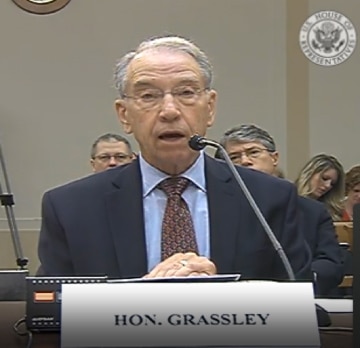Sen. Chuck Grassley believes the Department of Justice has moved to dismiss false claims cases without considering the merits or conducting cost-benefit analyses.
In a September 4 letter to Attorney General William Barr, Grassley writes that he is concerned about the DOJ’s “efforts to dismiss greater numbers of qui tam (false claims) cases for reasons that appear primarily unrelated to the merits of individual cases. Those efforts rely at least in part on vague and at times questionable concerns over prerogatives or limited government resources to handle the cases.”
The Iowa Republican notes that such actions “could undermine the purpose of the False Claims Act by discouraging whistleblowers and dismissing potentially serious fraud on the taxpayers.”
Grassley and others have raised concerns about the increase in the DOJ’s motions dismiss cases brought on the government’s behalf. The change follows the emergence of the 2018 Granston memo, which recommended government dismissal of whistleblower cases that were costly or lacked merit.
From an Aug. 22 Bloomberg Law story:
Since the Granston memo, the government has moved to dismiss at least 14 cases involving pharmaceuticals, according to a Bloomberg Law analysis. This includes 11 brought by the National HealthCare Analysis Group alleging violations of anti-kickback laws that prohibit improper marketing of drugs to medical professionals.
The group has been criticized for being “professional relators”—whistleblowers who don’t have independent, inside information and instead rely on publicly available or data-mined information.
Both the story and Grassley’s letter refer to the DOJ’s attempt to dismiss a case against drugmaker Gilead Sciences. Whistleblowers accuse the company of manufacturing drugs using contaminated ingredients from China. From Bloomberg:
The case—U.S. ex rel. Campie v. Gilead—will be a test of the DOJ’s authority to dismiss fraud cases brought by whistleblowers on behalf of the government under the False Claims Act. The government made the unusual move to dismiss the case in April, stating that it would be a costly burden on the DOJ, according to court documents.
Grassley describes this and several other cases he believes the DOJ dismissed without evaluating the merits. He asks DOJ for details on application of the Granston memo.
Denying relators the right to pursue False Claims Act cases if the government does not intervene is counter to the basic, essential purpose of the Act, which is to empower private citizens to help the government fight fraud. DOJ’s actions in these cases will send a clear message that bad actors can get away with fraud as long as they make litigating painful and sufficiently burdensome for the government.
Resources
Forbes: Trump’s DOJ Acts On Threat To Trial Lawyers Who Sue On Behalf Of The Government
National Law Review: DOJ Seeks Dismissal of FCA Qui Tam Case to Escape Onerous Discovery Obligations
National Whistleblower Center: False Claims Act FAQ
